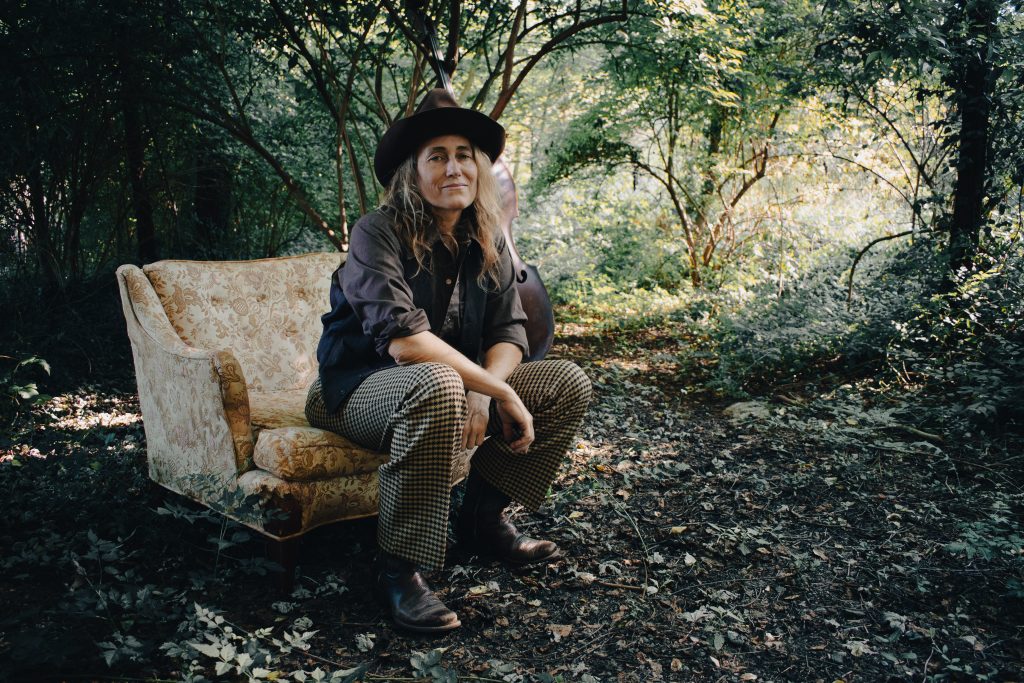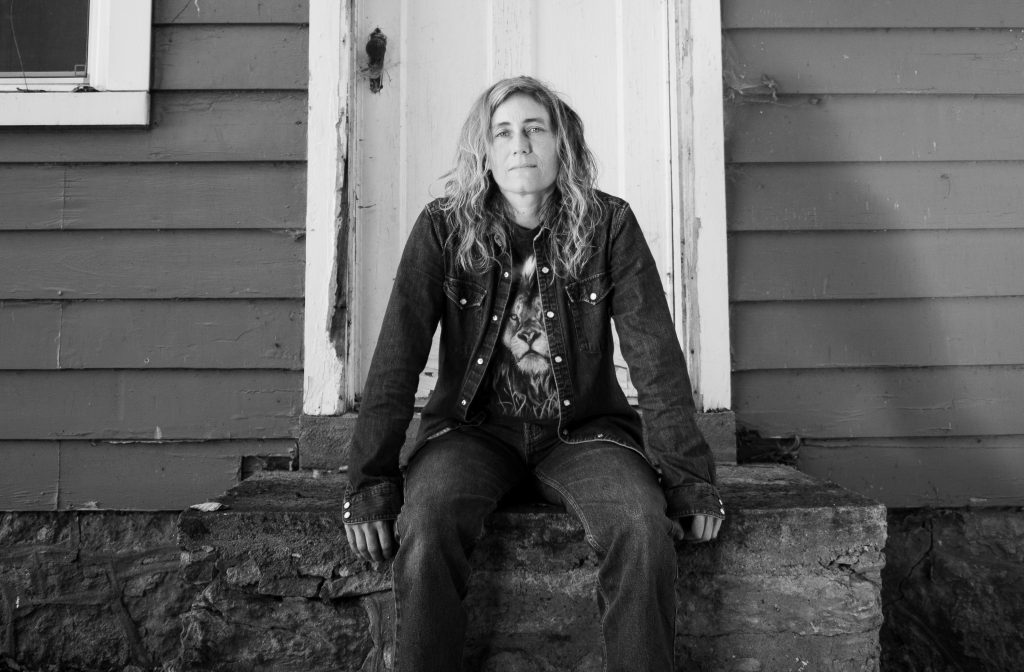Scenes From Melissa Carper’s Ongoing Ramblin’ Adventure
By Lily Rex

Following the release of her second solo album Ramblin’ Soul on Nov. 18, Melissa Carper chatted with Country Queer about how she finds inspiration and the roots of her tendency to roam.
As an album, Ramblin’ Soul affirms a definitive sound for Carper whose pandemic-released Daddy’s Country Gold stopped listeners dead in their tracks with its combined one-two punch of personable songwriting set to a country-swing soundtrack so authentically vintage, you’d swear it was recorded a few decades prior to Asleep At The Wheel’s 1974 debut. Carper has indeed struck country gold.
And one thing’s for sure about her: when she says she’s got a ramblin’ soul, she’s not embellishing the truth; she’s got plenty of stories to back it up. From fish factories in Petersburg, Alaska, to the organic vegetable farm just outside Austin that she and her partner worked and lived on during the pandemic, to some thought-provoking ideas about Bigfoot (yup, you read that right), Carper’s been ramblin’ for decades. Though she hasn’t written about all of them yet, she’s lived many lives.
As one might imagine, certain places stick with her more than others.
“Alaska feels like a completely different country,” she said. “I love and appreciate so many places. The community of Eureka Springs, Arkansas is really dear to my heart. I think certain towns have certain cultures. I’ve lived in New Orleans twice, and you kinda can’t separate the people from the music and the culture down there.”
The Carper Family band (once her main musical endeavor, now on hiatus) headlined a folk festival in Juneau, Alaska one year, but that wasn’t the first memory that came to mind when she expanded on her time there.
“I moved there for four or five months when I was 21 and worked at a fish factory. That was my introduction to Alaska,” she said. ”It was a big operation where big boats would come in, mostly with salmon. I was on an assembly line, and my job was toward the end of the line. After the fish had been gutted and they cut off the heads, you’d clean the blood out with a spoon that has a hose attached to it. That job was called ‘fish sliming.’”
12-hour shifts weren’t enough for Carper in her youthful hubris. She said she often signed up for extra four-hour shifts cleaning the cannery. “It was quite an experience. I don’t think I’d do that job again. It’s really hard on your hands. For me at 21, it was a big adventure.”
She stayed for a whole season, developing carpal tunnel from the experience and later needing corrective surgery. “A lot of young people like myself quit and went to work in the restaurants instead. For some reason, I was determined to stick it out. Just seeing Alaska was the really cool part of it, and meeting people. I made several friends.”
Carper believes her soul has rambled before and will ramble on when she’s gone.
“I do believe in past lives,” she said. “I’ve only come around to that in the past five or 10 years of my life, but it makes sense because I believe that we all have souls, and after we’re gone our souls continue to live, so wouldn’t our souls find another body to continue to live in?” She also acknowledged feeling a strong connection to Native Americans and Australian Aboriginal culture, so maybe she was among their ranks in a past life. She also said with a laugh she was “maybe some kind of extraterrestrial… something not human.”
Though she’s well-known as an upright bassist, Carper says being a bass player isn’t central to her songwriting—her songs just sort of ramble into existence. “My songs usually start with a tiny lyric idea,” she said. “Usually I can find a melody that falls around that lyric pretty quickly, and the song just flows from that beginning. I don’t play any instruments while I’m writing a song. I usually just write it in my head and sing it, then I’ll go to the guitar and find the chords.”
Carper’s ramblin’ nature pulled her away from university where she was studying classical bass on a scholarship straight out of high school. The road has taught her much, but she remains thankful for the instruction she got in her two and a half years at the University of Nebraska, Lincoln.
“I had a great bass professor,” she said, “but the focus was so much on classical, and I realized that I didn’t want to play classical music for a living. I didn’t have a passion for that kind of music. I did learn a bit of jazz, so that was really helpful. A couple things I took from that is being able to play in tune and in time, with good tone, and also understanding discipline.”
After practicing for four or five hours a day, the intensity wore on Carper’s wanderlust, and she began to burn out. “After two and a half years, I didn’t care anymore about certain things,” she said. “I didn’t care about music history or music theory. I couldn’t get my brain to accept any more information, and I felt this wild, adventurous free spirit in me. I felt like I was about to burst, and I just had to quit the structured lifestyle I was living. I just don’t think I could have done anything else.”
She later tried to go back, but only lasted another five weeks. Carper’s ramblin’ soul had made up its mind. And her queer heart had entered the picture, too.

“An interesting thought I’ve always had about that time, too, is that I hadn’t come out yet,” Carper said. “I didn’t come out until I was 23. I think that was another part of me just feeling like I had to get out. I wanted to get out of Nebraska, away from everything I knew, and try to find myself and be able to express myself and who I was.”
Are fish-sliming and Bigfoot songs on the horizon? Carper said she has the material for a new album she had considered recording in Spring 2023, but touring has been so exhausting that new music may have to wait. “There’s so much work that goes into it,” she said. “There’s a lot involved, especially if you’re gonna do it right with the promotion and all that stuff.”
“I’ve been doing this for a long time. I just have been doing it on a budget and not really investing in myself until now,” she added.
A revelation Carper has had about the country greats she’s always admired is that ramblin’ needn’t be a lonesome endeavor. Ramblin’ the way Carper does it is as much about meeting and being inspired by new people as it is about self-exploration and new places.
“I have a great team of folks helping me out,” Carper said. “I want to make sure that I mention the musicians on the album and the producers and give them credit as well because they really did so much to make those recordings sound the way they sound. It’s definitely a group effort to make those songs sound good. It’s never just me.”
Lily Rex (they/she) is a queer, Nashville-based writer obsessed with American history, rivers, and Country/Folk/Americana music. They hail from Northwest Indiana, where they amassed over 600 bylines in three years as a government watchdog reporter for an independent newspaper, and are the author of the poetry chapbook Rivers Have Friends Too (2021). Follow them on Instagram @rexpoet